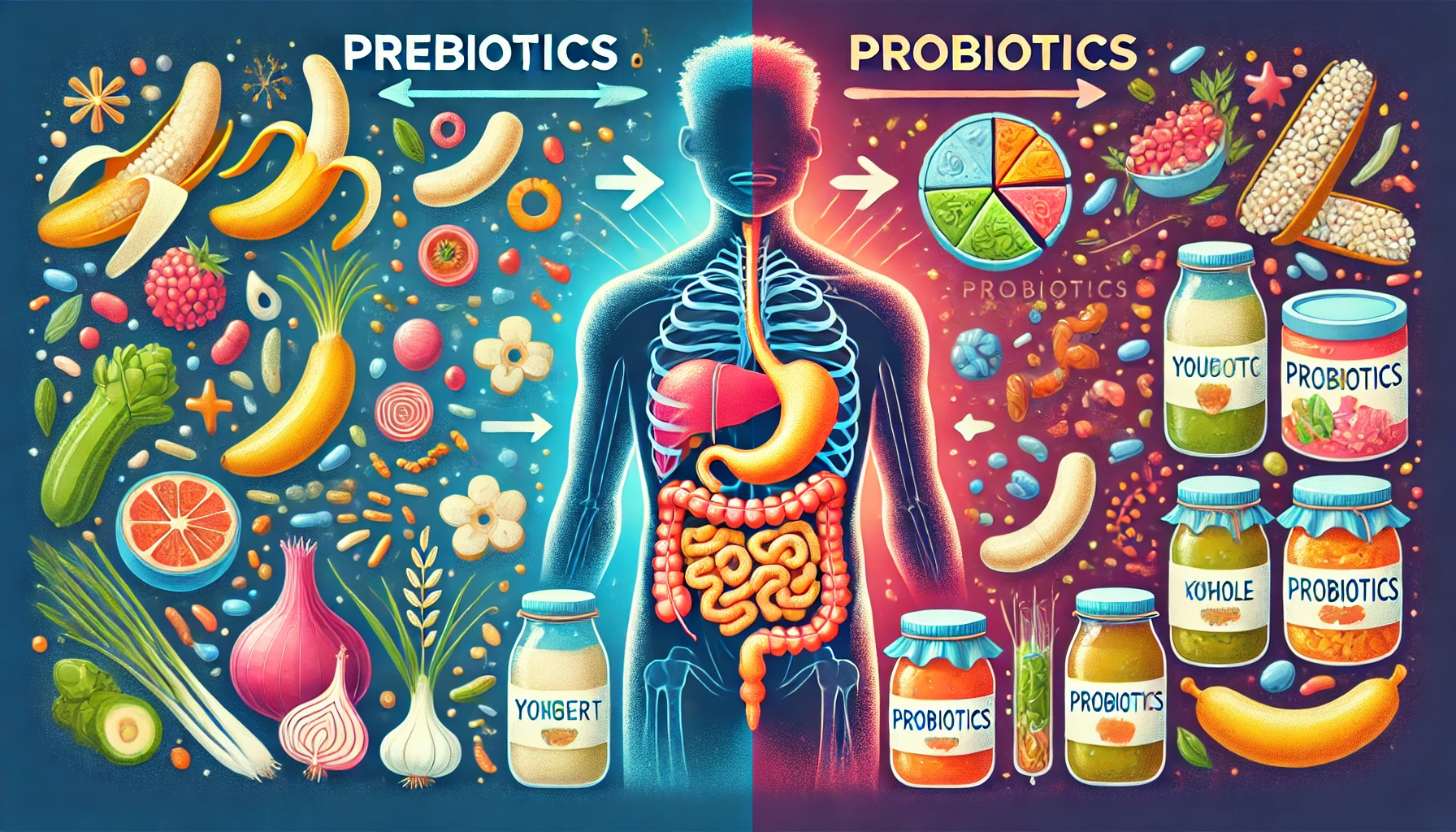Prebiotics vs. Probiotics: Do You Really Need Both?
prebiotic supplementsIntroduction Gut health is a crucial aspect of overall well-being, influencing digestion, immunity, and even mental health. With growing...

prebiotic supplementsIntroduction
Gut health is a crucial aspect of overall well-being, influencing digestion, immunity, and even mental health. With growing awareness of gut-friendly supplements, prebiotics and probiotics have gained significant popularity. But what exactly are they, and do you need both for optimal health? In this guide, we break down the differences between prebiotics and probiotics, their benefits, and how they work together to support gut health.
What Are Probiotics?
Probiotics are live beneficial bacteria that help maintain a balanced gut microbiome. These microorganisms support digestion, strengthen the immune system, and may even play a role in mental health. Probiotics are commonly found in fermented foods such as yogurt, kimchi, sauerkraut, and kombucha, as well as in dietary supplements.
Benefits of Probiotics:
- Enhance Digestion: Aid in breaking down food and absorbing nutrients efficiently.
- Support Immune Function: Help protect against harmful bacteria and infections.
- Promote Mental Health: Emerging research links gut bacteria to brain function and mood regulation.
- Reduce Bloating & Gas: Improve gut motility and reduce digestive discomfort.
What Are Prebiotics?
Prebiotics are non-digestible fibers that serve as food for beneficial gut bacteria. They help probiotics thrive, ensuring a healthy and diverse gut microbiome. Prebiotics are naturally found in foods such as bananas, onions, garlic, leeks, asparagus, and whole grains.
Benefits of Prebiotics:
- Nourish Good Bacteria: Provide the necessary fuel for probiotic bacteria to grow and function effectively.
- Improve Digestive Health: Support regular bowel movements and reduce constipation.
- Enhance Nutrient Absorption: Help the body absorb essential minerals such as calcium and magnesium.
- Boost Immune Response: Strengthen gut barrier function, reducing susceptibility to infections.
Prebiotics vs. Probiotics: Key Differences
| Feature | Prebiotics | Probiotics |
| Definition | Non-digestible fibers that feed good bacteria | Live beneficial bacteria that support gut health |
| Function | Stimulate the growth of probiotics | Maintain gut microbiome balance |
| Found in | Foods like bananas, onions, and whole grains | Fermented foods like yogurt, kimchi, and kombucha |
| Health Benefits | Improve digestion, boost immunity, enhance nutrient absorption | Aid digestion, reduce bloating, support mental health |
Do You Need Both Prebiotics and Probiotics?
Yes! While probiotics introduce beneficial bacteria into your gut, prebiotics help sustain and nourish these bacteria. Taking both ensures a well-balanced and thriving gut microbiome.
For individuals experiencing digestive issues, supplementing with both prebiotic supplements and probiotics can offer significant health benefits. The best approach is to consume a variety of prebiotic-rich foods alongside probiotic sources or supplements.
Choosing the Best Prebiotic Supplements and Probiotics
When selecting supplements, consider the following:
- High-Quality Ingredients: Choose supplements that are free from artificial additives and fillers.
- Strain Diversity: Opt for probiotics with multiple strains for broader gut health benefits.
- Fiber Content: The best prebiotic supplements should include inulin, fructooligosaccharides (FOS), or galactooligosaccharides (GOS) for effective nourishment of gut bacteria.
- Brand Reputation: Look for trusted brands that offer clinically tested and science-backed formulas.
At NaturesHealthBox, we offer a carefully curated range of high-quality prebiotic supplements and probiotic formulas to help you achieve optimal gut health.
Conclusion
Both prebiotics and probiotics play essential roles in maintaining a healthy gut microbiome. While probiotics introduce beneficial bacteria, prebiotics act as fuel, ensuring their growth and effectiveness. By incorporating both into your diet, either through food or supplements, you can promote better digestion, enhance immunity, and improve overall well-being.
Looking for the best prebiotic supplements and probiotics? Visit NaturesHealthBox to explore our extensive selection of gut-friendly products designed to support your digestive health.
FAQs
1. Can I take prebiotics and probiotics together?
Yes! Taking prebiotics and probiotics together helps maintain a balanced gut microbiome by providing beneficial bacteria and the nutrients they need to thrive.
2. How long does it take for prebiotics and probiotics to work?
Results vary depending on individual health conditions, but most people notice improvements in digestion and gut health within a few weeks of consistent use.
3. Are there any side effects of taking prebiotics and probiotics?
Some people may experience mild bloating or gas initially as their gut microbiome adjusts. This usually subsides within a few days.
4. What is the best time to take prebiotic and probiotic supplements?
Probiotics are best taken on an empty stomach, while prebiotics can be consumed with meals. Always follow the recommended usage instructions on the supplement label.
5. Where can I buy high-quality prebiotic supplements and probiotics?
You can find a variety of trusted prebiotic supplements and probiotics at NaturesHealthBox, ensuring you receive the best options for gut health support.



